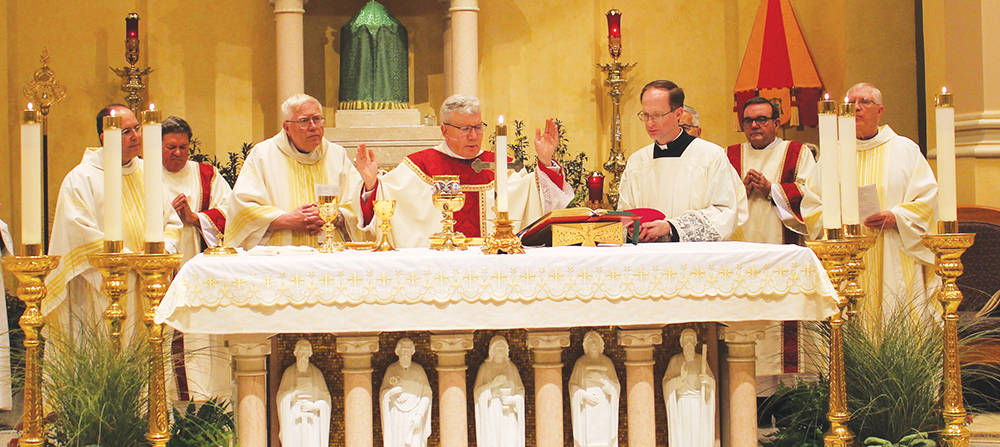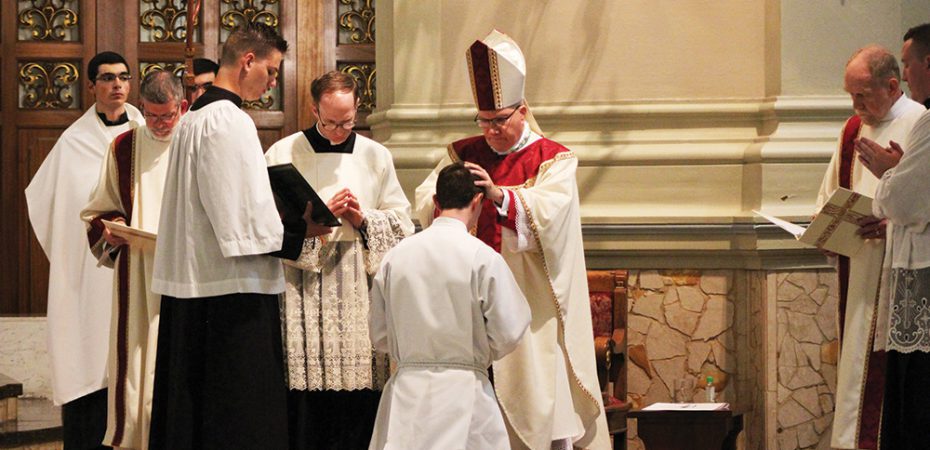The Bishop with His Deacons
Understanding the role of catechetical missionaries
Bishop Jeffrey M. Monforton Comments Off on The Bishop with His Deacons
Whoever serves me must follow me, and where I am, there also will my servant be. The Father will honor whoever serves me. — Jn 12:26.
In 1992, I had the privilege to be ordained a deacon in the Basilica of St. Peter in Vatican City by Cardinal James Hickey of Washington, D.C. For 18 months I exercised my diaconia at the holy sacrifice of the Mass, at the altar and in proclaiming the word of God. Furthermore, I had an opportunity to baptize and teach at one of the U.S. naval installations in Southern Italy. In my role, I assisted the base priest chaplain in his service both at liturgy and in our pastoral visits.
My appreciation of the deacon’s role grew following my presbyteral ordination in 1994 as I embraced the roles of parochial vicar, priest secretary to Cardinal Adam Maida, pastor and seminary rector. Finally, following my episcopal ordination in 2012, repeatedly I have had the blessing to ordain men to the diaconate.
Ministry of Catechesis
The Church instructs that everybody in the parish community possesses a role in the ministry of catechesis. For his part, the bishop is to be a living sign of Christ (cf. Lumen Gentium, No. 21). The bishop has the primary role of the preacher of the word and exhibiting proper Christian conduct, providing the proper catechesis consistent with the norms issued by the Holy See. As the Church was built upon the foundation of the apostles (cf. Eph 2:20), those very apostles, through the prompting of the Holy Spirit, chose assistants, or deacons, through the gift of laying on of hands to serve at the request of the apostles (cf. Acts 6:1-6).
Each member of the Christian community is responsible for the ministry of catechesis, and that ministry is defined by each person’s particular condition in the Church (cf. National Directory for Catechesis, No. 111). The deacon is more than boots on the ground. For his part, the deacon serves the “people of God in the ministry of the word in communion with the bishop and his presbyterium” (Code of Canon Law, No. 757).
Sources of Catechesis
Among the sources of catechesis entrusted to the deacon is the word of God. Catechesis draws its message from sacred Scripture: “It is essential that the revealed word radically enrich our catechesis and all our efforts to pass on the faith” (Evangelii Gaudium, No. 175). It is in the school of liturgy where the faithful deepen their encounter with Jesus Christ as members of the Body of Christ.
The revealed word of God plumbs the very depths of each person because it is both living and active. The Church is entrusted with the word of God to transform humanity into God’s living presence. This is called the eschatological manifestation of the Lord: “This expectation is never passive; rather it is a missionary drive to proclaim the word of God which heals and redeems every man” (Verbum Domini, No. 121). The deacon himself, as he assists the bishop, must make every effort to deepen his appreciation of sacred Scripture, thereby enabling himself to more effectively share the salvific truths of Christ with all people.
This catechetical responsibility is perfectly shared in the sacred liturgy. A deacon’s vocation has been given to him by God and has been nurtured by the Church. As a result, he has been entrusted with certain responsibilities in the exercise of his holy ministry: the office of deacon. While the liturgy cannot be minimalized to a simple gathering in the primary intention of catechesis, the liturgy is, however, “the privileged place for catechizing the People of God” (Catechism of the Catholic Church, No. 1074).

Service
The summit of the celebration of Mass is, of course, the Liturgy of the Eucharist itself. As a deacon preaches the word of God in the Liturgy of the Word, he directs his very self to the altar in the Eucharist, assisting the bishop or the priest all the while conveying to all that what he preaches is not himself, but Jesus Christ as Lord. The deacon himself has been ordained to serve the word and to serve at the altar of God, both of which provide his foundation in service to the People of God. The very blueprint of the deacon’s service to the bishop in serving the People of God is found in the earliest days of the Church (cf. Acts 6).
Outside of the sacred liturgy, the deacon continues to strengthen his ability to proclaim the word through his daily prayer, especially in the celebration of the Liturgy of the Hours, in which he prays with the Church to continue the mission entrusted to the first apostles by Jesus Christ himself. Not unlike the great saints in the past, the deacon is to be a missionary disciple never content with the status quo of his surroundings, always finding ways to share the truth of Jesus Christ. In our present era, which embraces relativism and autonomous individualism as cultural deities, the deacon must recognize that both of these assertions are incompatible with his vocation. In his promise of obedience to the bishop, the deacon promises to remain in the truth all the while being in continuity with the ages in salvation history.
God and Neighbor
The diaconia of the word of God is the very substance between liturgy and charity in which they serve the People of God as a loving servant (cf. Directory of Catechesis, No. 117; Phil 2:5-11). This occurs both through parish and diocesan initiatives. In the area of catechesis, the deacon can be quite valuable in the life of charity and of the family, especially reaching out to those on the periphery of society (cf. Directory of Catechesis, No. 118).
Jesus Christ instructs us that “unless a grain of wheat falls to the ground and dies, it remains just a grain of wheat; but if it dies, it produces much fruit” (Jn 12:24). A deacon’s vocation, nurtured by the Church, is equipped with certain responsibilities as the deacon dies to the world to serve it. By virtue of holy orders, the deacon, as he assists the bishop, is called to serve both God and neighbor with an undivided heart recalling who is both the source and end of his catechetical activity: Our Lord, Jesus Christ, who died so that you and I may have eternal life.
……………………………………………………………………………………………………………………………………………………….
Ordained for the Diocese or Parish?
“Whenever a person is ordained, he is to serve the diocesan Church. Deacons are no different in this regard: they are assigned by the bishop to ministries for which the bishop perceives a great need, and for which the deacon may have special gifts or talents. Most often, this will be within a parish setting, just as most priests serve in a parish.” — USCCB, “Is a Deacon ordained for the Parish or the Diocese,” Frequently Asked Questions About Deacons
……………………………………………………………………………………………………………………………………………………….
As a bishop, I am profoundly grateful to Our Lord for the deacons in my diocese who share in my responsibility as catechetical missionaries. To put it pointedly, they assist me in the salvation of souls, and we do so by perfectly imitating Christ.
We imitate Christ perfectly through the promise of the very obedience of Christ himself who came down from heaven not to do his own will, but rather the will of the One who sent him (cf. Phil 2:7-8). Obedience shares an inseparable link with the community, for the entire Church. We are called to go out and proclaim the kingdom of God to all the world.
Credible Witness
How may the deacon be a credible catechetical witness? The how is critical in any effective missionary catechesis, for the deacon must live his life compelling people to come to Church through his warmness, not necessarily his toughness. Pope Francis states, quite pointedly, “Lay people are, put simply, the vast majority of the people of God. The minority — ordained ministers — are at their service” (Evangelii Gaudium, No. 102). Our ability to catechize is most effective and convincing through our charity and fidelity to the Faith. Not to make too fine a point, but we do not simply serve our brothers and sisters, we love them.
Personal perception of one’s surroundings does not ensure an objective understanding of the world in which we live. Proper and effective catechesis communicates that our faith in the passion, death and resurrection of Jesus Christ provides the clarity to see our world as God sees it. In his critical service to his bishop, the deacon provides that clarity through his proclamation of the word of God, his assistance at the altar and in his variety of service to our fellow brothers and sisters.
I am grateful to my brother deacons for proclaiming the word of God in their service at the holy altar and in their common outreach to our fellow brothers and sisters. In my role as bishop, I depend on my deacons to assist the People of God as Stephen and the first deacons faithfully did for the first bishops in the early Church. The United States Conference of Catholic Bishops’ Committee on Evangelization and Catechesis, in its definition on evangelizing catechesis, provides clearly this common catechetical goal of both the bishop and his deacons seeks to deepen a redemptive encounter with Jesus Christ through the power of the Holy Spirit. Further, it offers the following characteristics: proclaims the heart of the Gospel in the kerygma; accompanies people to a personal response of faith and conversion in becoming disciples; provides a systematic exposition of God’s revelation within the Christian community; sends out missionary disciples as witnesses to the Gospel.
BISHOP JEFFREY M. MONFORTON is bishop of the Diocese of Steubenville, Ohio.
………………………………………………………………………………………………………………………………………………………
Integrity of the Gospel Message
“In its task of inculturating the faith, catechesis must transmit the Gospel message in its integrity and purity. Jesus proclaimed the Gospel integrally: ‘ … because I have made known to you all that I have heard from my Father’ (Jn 15:15). This same integrity is demanded by Christ of his disciples in his sending them on mission to preach the Gospel: ‘… and teaching them to observe all that I have commanded you’ (Mt 28:19). A fundamental principle of catechesis, therefore, is that of safeguarding the integrity of the message and avoiding any partial or distorted presentation: ‘In order that the sacrificial offering of his or her faith should be perfect, the person who becomes a disciple of Christ has the right to receive “the words of faith,” not in mutilated, falsified or diminished form but whole and entire, in all its rigor and vigor’” — General DIrectory for Catechesis, No. 111
……………………………………………………………………………………………………………………………………………………….





